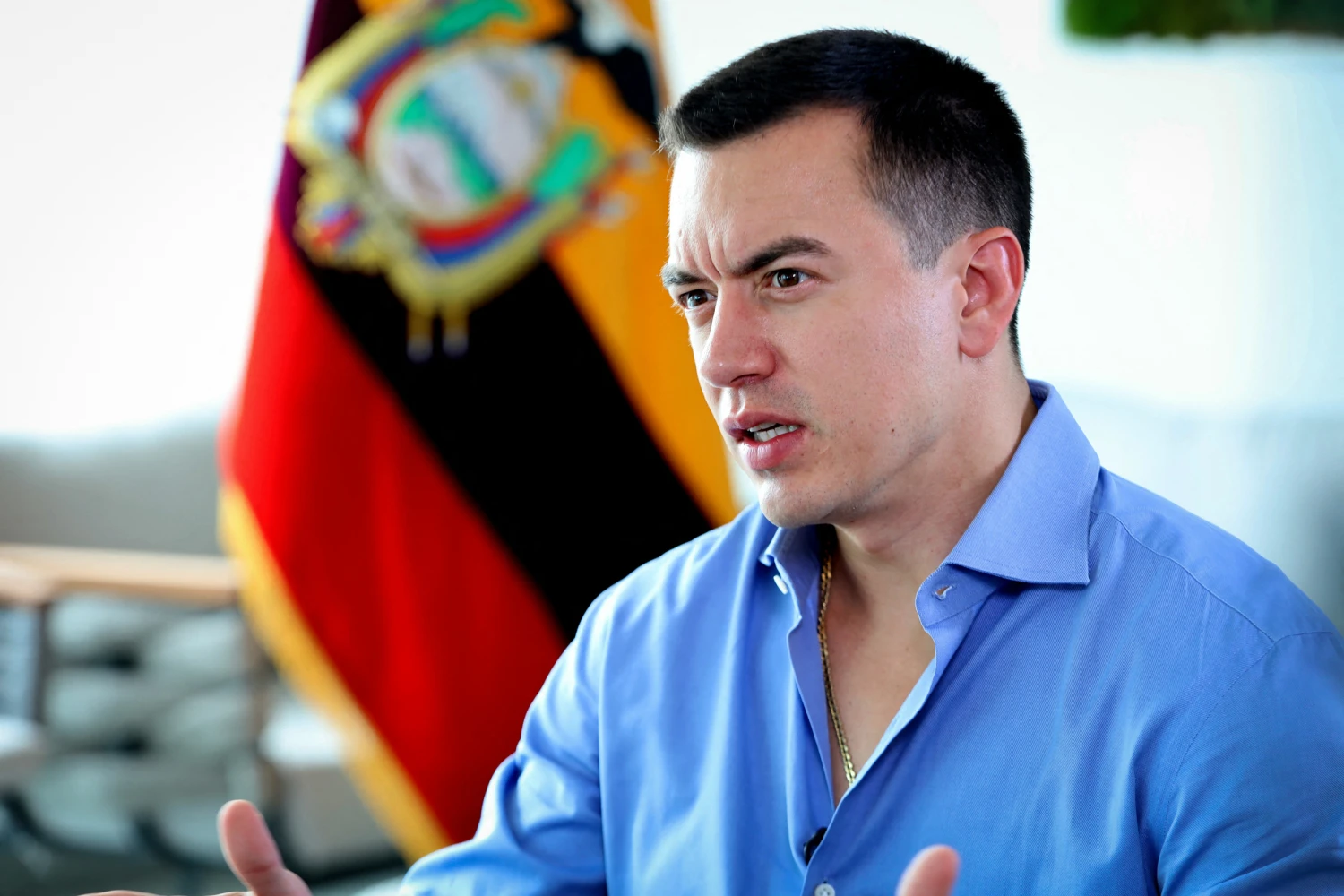Carlos Javier Vega, 19, had requested to switch shifts at his father’s bakery in Guayaquil, Ecuador’s largest city, so he could assist his cousin in selling a puppy.
However, just a few blocks from the buyer’s location, their vehicle was stopped at a checkpoint manned by navy troopers. These troops had been deployed onto the streets following President Daniel Noboa’s declaration of an “internal armed conflict” against organized crime.
Vega’s cousin attempted to make a U-turn, inadvertently clipping a soldier and a military vehicle. This led to an argument, during which the troops opened fire. Vega was struck by four bullets and died, while his cousin survived a gunshot wound to the shoulder.
The government quickly labeled the two unarmed victims as “terrorists” who had allegedly attempted an “attack on a military checkpoint.”
However, the public prosecutor’s office dismissed these claims and cleared them of any wrongdoing. Despite this, the government has never issued an apology.
“His death destroyed our family,” said Vega’s father, Carlos Vicente Vega Molina, 55.
“I don’t want my son’s death to go unpunished like so many others,” said his mother, Laura Ipanaqué, 43.
Vega’s case, along with that of four Black boys who died in December after being detained by the military, stands out as one of the most serious examples of human rights violations since Noboa implemented his mano dura (iron fist) policy a year ago in response to a significant rise in violent crime.
This Sunday, that policy—along with Noboa’s brief 14-month tenure—will be put to the test as approximately 13 million Ecuadorians cast their votes in the first round of the presidential election.
At 37, Noboa, the heir to a banana fortune, became Ecuador’s youngest president in 2023 after an unexpected victory in a snap election.
This election had been held to complete the term of the former president, Guillermo Lasso, who had dissolved Congress and resigned to avoid impeachment. Noboa was also one of three Latin American presidents who attended Donald Trump’s inauguration at the US Capitol, alongside El Salvador’s Nayib Bukele and Argentina’s Javier Milei.
“Noboa’s presidency has been marked above all by a radicalisation against human rights,” said journalist Karol Noroña, who led an investigation revealing inconsistencies in the military’s account of Vega’s death.
While she acknowledged that “human rights violations aren’t typically discussed in Ecuadorian households,” she pointed out that other issues—such as an energy crisis causing scheduled blackouts of up to 14 hours—could influence the upcoming election.
Guillaume Long, a senior research fellow at the Center for Economic and Policy Research, described Noboa’s administration as exhibiting “clear signs of authoritarianism and a disregard for the rule of law, constitutional practices, and rights.”
He cited the president’s refusal to step down during the 30-day electoral campaign period, as required by the constitution, and an unprecedented diplomatic incident in which Ecuadorian police and military forces stormed the Mexican embassy in Quito to arrest Jorge Glas, a former vice president under leftist leader Rafael Correa.

President Daniel Noboa (Photo: Getty Images)
“Noboa also has a tendency of ruling by emergency decrees in all sorts of ways,” said Long, who previously served as Ecuador’s foreign minister under Correa.
Last year, the country was under a state of emergency for 250 days, allowing actions such as warrantless home raids and a ban on the right to assembly. Noboa has defended these measures as necessary in the fight against gangs.
In April, the right-wing president won a referendum supporting his security plan. However, Long cautioned that this did not necessarily mean Noboa enjoys enough popular support for an easy victory in Sunday’s election, despite polls suggesting an advantage for the incumbent.
“When campaigning for the referendum, Noboa said he hadn’t been able to reduce crime because his hands were tied. Nearly a year later, he still has not delivered,” Long said.
Once one of Latin America’s safest countries, Ecuador saw violence surge as its ports became what is described as a “cocaine superhighway” to the US and Europe.
While there was an initial drop in homicides when Noboa launched his “war on drugs,” the rates soon climbed back to alarming levels, making 2024 the second most violent year on record. Meanwhile, kidnapping and extortion have continued to rise.
In Cañaveral, a struggling neighborhood in the northwest of Guayaquil, residents are forced to pay a weekly vacuna (extortion fee) of $2 to the local gang.
“If you don’t pay, they’ll break into your house and take your things. Sometimes, the $2 is the only money I have, so I end up not buying food or water for my children,” said one resident.
European officials have credited Noboa’s crackdown for a significant reduction in drug shipments. However, Spain’s largest-ever cocaine seizure, in November, came from a banana-laden ship that departed from Guayaquil.
“How does a 13-tonne shipment get through the port? There is a policy of zero control at the maritime ports in Ecuador,” said Mónica Luzárraga, a former public defender in Guayaquil who has worked on hundreds of drug-trafficking cases in recent years.
“The balance of this internal armed conflict is disastrous in terms of human rights and criminal control,” she said. “Now, the citizens are not only victims of criminal groups but also of the abuses committed by the armed forces.”
In Vega’s case, two navy soldiers and a corporal are awaiting trial while out on bail. “I forgive those people because we’ve been taught about forgiveness, but that doesn’t mean they shouldn’t be judged for all the harm they’ve caused us,” said Vega’s mother, Laura Ipanaqué.
“The truth is, the soldiers didn’t just kill my son – they killed us too,” she said.
